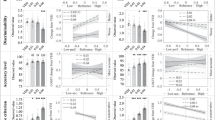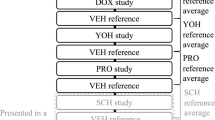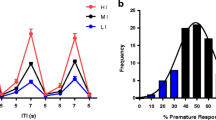Abstract
Rationale
The rodent Continuous Performance Test (rCPT) is a novel rodent paradigm to assess attention and impulsivity that resembles the human CPT. This task measures the rodents’ ability to discriminate between target and non-target stimuli. The effect of attention-deficit/hyperactivity disorder (ADHD) medication on rCPT performance in mice remains to be fully characterized.
Objective
To investigate the predictive validity of the mouse rCPT by studying the effects of ADHD medication methylphenidate, atomoxetine, amphetamine, guanfacine, and modafinil in four behavioral subgroups based on performance and impulsivity levels.
Methods
Two cohorts of male C57BL/6J mice were used, and the effect of treatment was tested in a variable stimulus duration probe. Performance and impulsive subgroups were made based on discriminability and percentage premature responses, respectively.
Results
Methylphenidate, atomoxetine, and amphetamine improved performance in the low-performing animals, with no effect in the high-performers. These improvements were a result of increased hit rate and/or decreased false-alarm rate. Furthermore, these drugs decreased percentage premature responses in the high-impulsive group. Methylphenidate, guanfacine, and modafinil increased premature responses in the low-impulsive group. Modafinil impaired performance in the high-performers by increasing false-alarm rate.
Conclusion
The effect of ADHD treatment was dependent on baseline, as seen by increases in performance for the low-performers and decreases in impulsivity for the high-impulsive animals. These results agree with clinical data and may support the inverted U-shaped arousal-performance theory. The rCPT combined with behavioral separation into subgroups has high predictive validity, and our study is a step forward towards establishing the clinical translatability of the rCPT.


Similar content being viewed by others
References
Adler LA, Liebowitz M, Kronenberger W, Qiao M, Rubin R, Hollandbeck M, Deldar A, Schuh K, Durell T (2009) Atomoxetine treatment in adults with attention-deficit/hyperactivity disorder and comorbid social anxiety disorder. Depress Anxiety 26:212–221. https://doi.org/10.1002/da.20549
Aron AR, Dowson JH, Sahakian BJ, Robbins TW (2003) Methylphenidate improves response inhibition in adults with attention-deficit/hyperactivity disorder. Biol Psychiatry 54:1465–1468
Bari A, Eagle DM, Mar AC, Robinson ES, Robbins TW (2009) Dissociable effects of noradrenaline, dopamine, and serotonin uptake blockade on stop task performance in rats. Psychopharmacology 205:273–283. https://doi.org/10.1007/s00213-009-1537-0
Bate ST, Clark RA (2015) invivostat.co.uk, 3.4 edn
Bhakta SG, Young JW (2017) The 5 choice continuous performance test (5C-CPT): a novel tool to assess cognitive control across species. J Neurosci Methods 292:53–60. https://doi.org/10.1016/j.jneumeth.2017.07.011
Bismark AW, Thomas ML, Tarasenko M, Shiluk AL, Rackelmann SY, Young JW, Light GA (2018) Reverse translated and gold standard continuous performance tests predict global cognitive performance in schizophrenia. Transl Psychiatry 8:80. https://doi.org/10.1038/s41398-018-0127-5
Blondeau C, Dellu-Hagedorn F (2007) Dimensional analysis of ADHD subtypes in rats. Biol Psychiatry 61:1340–1350. https://doi.org/10.1016/j.biopsych.2006.06.030
Caballero-Puntiverio M, Fitzpatrick CM, Woldbye DP, Andreasen JT (2017) Effects of amphetamine and methylphenidate on attentional performance and impulsivity in the mouse 5-choice serial reaction time task. J Psychopharmacol (Oxford, England) 31:272–283. https://doi.org/10.1177/0269881116684339
Caprioli D, Jupp B, Hong YT, Sawiak SJ, Ferrari V, Wharton L, Williamson DJ, McNabb C, Berry D, Aigbirhio FI, Robbins TW, Fryer TD, Dalley JW (2015) Dissociable rate-dependent effects of oral methylphenidate on impulsivity and D(2/3) receptor availability in the striatum. J Neurosci 35:3747–3755. https://doi.org/10.1523/JNEUROSCI.3890-14.2015
Chamberlain SR, Del Campo N, Dowson J, Muller U, Clark L, Robbins TW, Sahakian BJ (2007) Atomoxetine improved response inhibition in adults with attention deficit/hyperactivity disorder. Biol Psychiatry 62:977–984. https://doi.org/10.1016/j.biopsych.2007.03.003
Chamberlain SR, Robbins TW, Winder-Rhodes S, Muller U, Sahakian BJ, Blackwell AD, Barnett JH (2011) Translational approaches to frontostriatal dysfunction in attention-deficit/hyperactivity disorder using a computerized neuropsychological battery. Biol Psychiatry 69:1192–1203. https://doi.org/10.1016/j.biopsych.2010.08.019
Chappell PB et al (1995) Guanfacine treatment of comorbid attention-deficit hyperactivity disorder and Tourette’s syndrome: preliminary clinical experience. J Am Acad Child Adolesc Psychiatry 34:1140–1146. https://doi.org/10.1097/00004583-199509000-00010
Conners CK (2014) Conners’ continuous performance test third edition: Computer program for windows technical guide and software manual. Multi-Health Systems, North Tonawanda
Cope ZA, Young JW (2017) The five-choice continuous performance task (5C-CPT): a cross-species relevant paradigm for assessment of vigilance and response inhibition in rodents current protocols in neuroscience / editorial board, Jacqueline N Crawley [et al] 78:9.56.51–59.56.18 https://doi.org/10.1002/cpns.20
Cope ZA, Minassian A, Kreitner D, MacQueen DA, Milienne-Petiot M, Geyer MA, Perry W, Young JW (2017) Modafinil improves attentional performance in healthy, non-sleep deprived humans at doses not inducing hyperarousal across species. Neuropharmacology 125:254–262. https://doi.org/10.1016/j.neuropharm.2017.07.031
Dalley JW, Robbins TW (2017) Fractionating impulsivity: neuropsychiatric implications. Nat Rev Neurosci 18:158–171. https://doi.org/10.1038/nrn.2017.8
de Jongh R, Bolt I, Schermer M, Olivier B (2008) Botox for the brain: enhancement of cognition, mood and pro-social behavior and blunting of unwanted memories. Neurosci Biobehav Rev 32:760–776. https://doi.org/10.1016/j.neubiorev.2007.12.001
de Wit H, Enggasser JL, Richards JB (2002) Acute administration of d-amphetamine decreases impulsivity in healthy volunteers. Neuropsychopharmacology 27:813–825. https://doi.org/10.1016/s0893-133x(02)00343-3
Ding Z, Brown JW, Rueter LE, Mohler EG (2018) Profiling attention and cognition enhancing drugs in a rat touchscreen-based continuous performance test. Psychopharmacology 235:1093–1105. https://doi.org/10.1007/s00213-017-4827-y
Fernando AB et al (2012) Modulation of high impulsivity and attentional performance in rats by selective direct and indirect dopaminergic and noradrenergic receptor agonists. Psychopharmacology 219:341–352. https://doi.org/10.1007/s00213-011-2408-z
Finke K, Dodds CM, Bublak P, Regenthal R, Baumann F, Manly T, Muller U (2010) Effects of modafinil and methylphenidate on visual attention capacity: a TVA-based study. Psychopharmacology 210:317–329. https://doi.org/10.1007/s00213-010-1823-x
Fitzpatrick CM, Maric VS, Bate ST, Andreasen JT (2018) Influence of intertrial interval on basal and drug-induced impulsive action in the 5-choice serial reaction time task: effects of d-amphetamine and (+/−)-2,5-dimethoxy-4-iodoamphetamine (DOI). Neurosci Lett 662:351–355. https://doi.org/10.1016/j.neulet.2017.10.058
Goetghebeur PJD, Swartz JE (2016) True alignment of preclinical and clinical research to enhance success in CNS drug development: a review of the current evidence. J Psychopharmacol 30:586–594. https://doi.org/10.1177/0269881116645269
Gualtieri CT, Johnson LG (2005) ADHD: is objective diagnosis possible? Psychiatry (Edgmont) 2:44–53
Horner AE, Heath CJ, Hvoslef-Eide M, Kent BA, Kim CH, Nilsson SRO, Alsiö J, Oomen CA, Holmes A, Saksida LM, Bussey TJ (2013) The touchscreen operant platform for testing learning and memory in rats and mice. Nat Protoc 8:1961–1984. https://doi.org/10.1038/nprot.2013.122
Howe WM, Ji J, Parikh V, Williams S, Mocaër E, Trocmé-Thibierge C, Sarter M (2010) Enhancement of attentional performance by selective stimulation of α4β2(*) nAChRs: underlying cholinergic mechanisms. Neuropsychopharmacology 35:1391–1401. https://doi.org/10.1038/npp.2010.9
Kim CH, Hvoslef-Eide M, Nilsson SRO, Johnson MR, Herbert BR, Robbins TW, Saksida LM, Bussey TJ, Mar AC (2015) The continuous performance test (rCPT) for mice: a novel operant touchscreen test of attentional function. Psychopharmacology 232:3947–3966. https://doi.org/10.1007/s00213-015-4081-0
Koda K, Ago Y, Cong Y, Kita Y, Takuma K, Matsuda T (2010) Effects of acute and chronic administration of atomoxetine and methylphenidate on extracellular levels of noradrenaline, dopamine and serotonin in the prefrontal cortex and striatum of mice. J Neurochem 114:259–270. https://doi.org/10.1111/j.1471-4159.2010.06750.x
Kuczenski R, Segal D (1989) Concomitant characterization of behavioral and striatal neurotransmitter response to amphetamine using in vivo microdialysis. J Neurosci 9:2051–2065
Loos M, Staal J, Schoffelmeer AN, Smit AB, Spijker S, Pattij T (2010) Inhibitory control and response latency differences between C57BL/6J and DBA/2J mice in a go/no-go and 5-choice serial reaction time task and strain-specific responsivity to amphetamine. Behav Brain Res 214:216–224. https://doi.org/10.1016/j.bbr.2010.05.027
Losier BJ, McGrath PJ, Klein RM (1996) Error patterns on the continuous performance test in non-medicated and medicated samples of children with and without ADHD: a meta-analytic review. J Child Psychol Psychiatry Allied Discip 37:971–987
Lustig C, Kozak R, Sarter M, Young JW, Robbins TW (2013) CNTRICS final animal model task selection: control of attention. Neurosci Biobehav Rev 37:2099–2110. https://doi.org/10.1016/j.neubiorev.2012.05.009
Ma ZQ, Hong ZY, Wang WS, Tao F (2012) Pharmacokinetics--pharmacodynamics of modafinil in mice. Yao xue xue bao = Acta Pharm Sin 47:101–104
MacQueen DA, Minassian A, Henry BL, Geyer MA, Young JW, Perry W (2018a) Amphetamine modestly improves Conners’ continuous performance test performance in healthy adults. J Int Neuropsychol Soc 24:283–293. https://doi.org/10.1017/s135561771700090x
MacQueen DA, Minassian A, Kenton JA, Geyer MA, Perry W, Brigman JL, Young JW (2018b) Amphetamine improves mouse and human attention in the 5-choice continuous performance test. Neuropharmacology 138:87–96. https://doi.org/10.1016/j.neuropharm.2018.05.034
Mar AC, Nilsson SRO, Gamallo-Lana B, Lei M, Dourado T, Alsiö J, Saksida LM, Bussey TJ, Robbins TW (2017) MAM-E17 rat model impairments on a novel continuous performance task: effects of potential cognitive enhancing drugs. Psychopharmacology 234:2837–2857. https://doi.org/10.1007/s00213-017-4679-5
Mehta MA, Owen AM, Sahakian BJ, Mavaddat N, Pickard JD, Robbins TW (2000) Methylphenidate enhances working memory by modulating discrete frontal and parietal lobe regions in the human brain. J Neurosci 20:Rc65
Mizuno K, Yoneda T, Komi M, Hirai T, Watanabe Y, Tomoda A (2013) Osmotic release oral system-methylphenidate improves neural activity during low reward processing in children and adolescents with attention-deficit/hyperactivity disorder. NeuroImage Clin 2:366–376. https://doi.org/10.1016/j.nicl.2013.03.004
Mueller A, Hong DS, Shepard S, Moore T (2017) Linking ADHD to the neural circuitry of attention. Trends Cogn Sci 21:474–488. https://doi.org/10.1016/j.tics.2017.03.009
Muller U, Steffenhagen N, Regenthal R, Bublak P (2004) Effects of modafinil on working memory processes in humans. Psychopharmacology 177:161–169. https://doi.org/10.1007/s00213-004-1926-3
Muller U et al (2005) Lack of effects of guanfacine on executive and memory functions in healthy male volunteers. Psychopharmacology 182:205–213. https://doi.org/10.1007/s00213-005-0078-4
Navarra R, Graf R, Huang Y, Logue S, Comery T, Hughes Z, Day M (2008) Effects of atomoxetine and methylphenidate on attention and impulsivity in the 5-choice serial reaction time test. Prog Neuro-Psychopharmacol Biol Psychiatry 32:34–41. https://doi.org/10.1016/j.pnpbp.2007.06.017
Ni HC, Hwang Gu SL, Lin HY, Lin YJ, Yang LK, Huang HC, Gau SS (2016) Atomoxetine could improve intra-individual variability in drug-naive adults with attention-deficit/hyperactivity disorder comparably with methylphenidate: a head-to-head randomized clinical trial. J Psychopharmacol (Oxford, England) 30:459–467. https://doi.org/10.1177/0269881116632377
NICE (2009) Attention deficit hyperactivity disorder: diagnosis and management of ADHD in children, young people and adults. In: NICE clinical guidelines, no. 72. National Collaborating Centre for Mental Health. British Psychological Society (UK), Leicester (UK)
Paterson NE, Ricciardi J, Wetzler C, Hanania T (2011) Sub-optimal performance in the 5-choice serial reaction time task in rats was sensitive to methylphenidate, atomoxetine and d-amphetamine, but unaffected by the COMT inhibitor tolcapone. Neurosci Res 69:41–50. https://doi.org/10.1016/j.neures.2010.10.001
Pillidge K, Porter AJ, Dudley JA, Tsai YC, Heal DJ, Stanford SC (2014a) The behavioural response of mice lacking NK(1) receptors to guanfacine resembles its clinical profile in treatment of ADHD. Br J Pharmacol 171:4785–4796. https://doi.org/10.1111/bph.12860
Pillidge K, Porter AJ, Vasili T, Heal DJ, Stanford SC (2014b) Atomoxetine reduces hyperactive/impulsive behaviours in neurokinin-1 receptor ‘knockout’ mice. Pharmacol Biochem Behav 127:56–61. https://doi.org/10.1016/j.pbb.2014.10.008
Repantis D, Schlattmann P, Laisney O, Heuser I (2010) Modafinil and methylphenidate for neuroenhancement in healthy individuals: a systematic review. Pharmacol Res 62:187–206. https://doi.org/10.1016/j.phrs.2010.04.002
Riccio CA, Waldrop JJ, Reynolds CR, Lowe P (2001) Effects of stimulants on the continuous performance test (CPT): implications for CPT use and interpretation. J Neuropsychiatr Clin Neurosci 13:326–335. https://doi.org/10.1176/jnp.13.3.326
Riccio CA, Reynolds CR, Lowe P, Moore JJ (2002) The continuous performance test: a window on the neural substrates for attention? Arch Clin Neuropsychol 17:235–272. https://doi.org/10.1016/S0887-6177(01)00111-1
Robbins TW (2002) The 5-choice serial reaction time task: behavioural pharmacology and functional neurochemistry. Psychopharmacology 163:362–380. https://doi.org/10.1007/s00213-002-1154-7
Robinson ES (2012) Blockade of noradrenaline re-uptake sites improves accuracy and impulse control in rats performing a five-choice serial reaction time tasks. Psychopharmacology 219:303–312. https://doi.org/10.1007/s00213-011-2420-3
Sanchez-Roige S, Pena-Oliver Y, Stephens DN (2012) Measuring impulsivity in mice: the five-choice serial reaction time task. Psychopharmacology 219:253–270. https://doi.org/10.1007/s00213-011-2560-5
Scahill L, Chappell PB, Kim YS, Schultz RT, Katsovich L, Shepherd E, Arnsten AFT, Cohen DJ, Leckman JF (2001) A placebo-controlled study of guanfacine in the treatment of children with tic disorders and attention deficit hyperactivity disorder. Am J Psychiatry 158:1067–1074. https://doi.org/10.1176/appi.ajp.158.7.1067
Shrout PE (1998) Measurement reliability and agreement in psychiatry. Stat Methods Med Res 7:301–317. https://doi.org/10.1177/096228029800700306
Tomlinson A, Grayson B, Marsh S, Harte MK, Barnes SA, Marshall KM, Neill JC (2014) Pay attention to impulsivity: modelling low attentive and high impulsive subtypes of adult ADHD in the 5-choice continuous performance task (5C-CPT) in female rats. Eur Neuropsychopharmacol 24:1371–1380. https://doi.org/10.1016/j.euroneuro.2014.04.008
Turner DC, Clark L, Dowson J, Robbins TW, Sahakian BJ (2004) Modafinil improves cognition and response inhibition in adult attention-deficit/hyperactivity disorder. Biol Psychiatry 55:1031–1040. https://doi.org/10.1016/j.biopsych.2004.02.008
Urban KR, Gao W-J (2014) Performance enhancement at the cost of potential brain plasticity: neural ramifications of nootropic drugs in the healthy developing brain. Front Syst Neurosci 8:38. https://doi.org/10.3389/fnsys.2014.00038
Wang SM, Han C, Lee SJ, Jun TY, Patkar AA, Masand PS, Pae CU (2017) Modafinil for the treatment of attention-deficit/hyperactivity disorder: a meta-analysis. J Psychiatr Res 84:292–300. https://doi.org/10.1016/j.jpsychires.2016.09.034
Waters KA, Burnham KE, O'Connor D, Dawson GR, Dias R (2005) Assessment of modafinil on attentional processes in a five-choice serial reaction time test in the rat. J Psychopharmacol (Oxford, England) 19:149–158. https://doi.org/10.1177/0269881105048995
Winstanley CA, Dalley JW, Theobald DE, Robbins TW (2004) Fractionating impulsivity: contrasting effects of central 5-HT depletion on different measures of impulsive behavior. Neuropsychopharmacology 29:1331–1343. https://doi.org/10.1038/sj.npp.1300434
Acknowledgements
The authors will like to thank Lars Arvastson and Simon Bate for their statistical advice.
Author information
Authors and Affiliations
Corresponding author
Ethics declarations
All procedures were approved by the Danish Animal Experiment Inspectorate.
Conflict of interest
The authors declare that they have no conflict of interest.
Additional information
Publisher’s note
Springer Nature remains neutral with regard to jurisdictional claims in published maps and institutional affiliations.
Electronic supplementary material
Online Resource 1
(DOC 9806 kb)
Rights and permissions
About this article
Cite this article
Caballero-Puntiverio, M., Lerdrup, L.S., Grupe, M. et al. Effect of ADHD medication in male C57BL/6J mice performing the rodent Continuous Performance Test. Psychopharmacology 236, 1839–1851 (2019). https://doi.org/10.1007/s00213-019-5167-x
Received:
Accepted:
Published:
Issue Date:
DOI: https://doi.org/10.1007/s00213-019-5167-x




